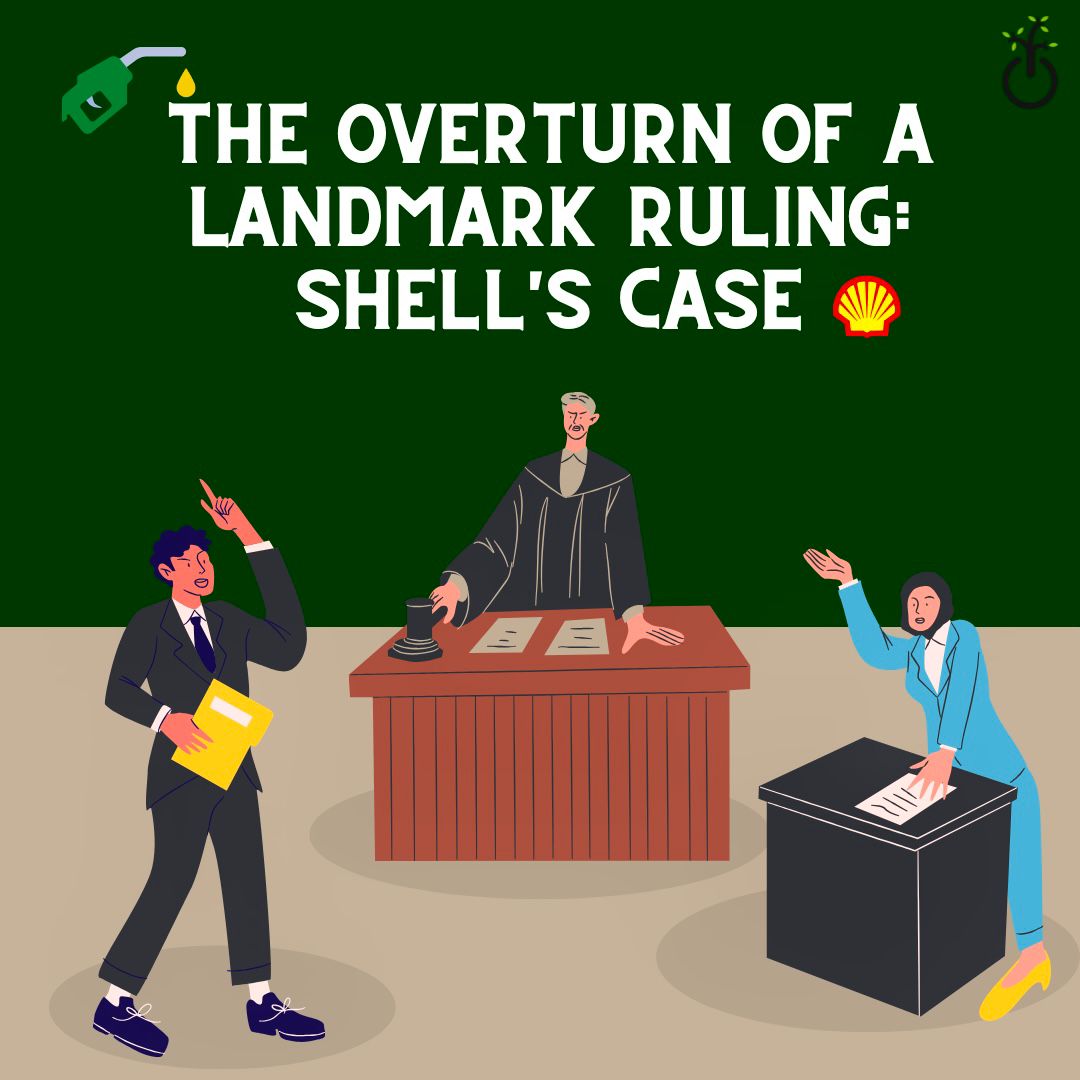On November 12, 2024, the Court of Appeal in The Hague dismissed the landmark climate ruling in favor of the Oil and Gas giant Shell. The landmark was initially ordered in May 2021. It mandated Shell to accelerate its carbon emission cut, precisely to reach 45% of its 2019 level by 2030.
It all started on April 5th, 2019, when Milieudefensie, an environmentalist group part of Friends of the Heart NL, together with other NGOs and 17000 citizens brought a court summons before the Hague District Court alleging Shell’s contributions to climate change violate its duty of care under Dutch law and human rights law.
The attacking party sought a court order imposing Shell to reduce its CO2 emissions by 45% of the 2019 level by 2030, and to 0% by 2050, in order to be in compliance with the Paris Agreement of 2015.
In May 2021, after multiple days of hearing, the Hague District Court ruled Shell guilty, and ordered it to cut its emissions to the aforementioned levels, including emissions caused by its products, known as Scope 3 emissions. The decision was taken on the basis of limiting Shell’s emissions from endangering Dutch citizens.
The hearing had an immediate worldwide impact. It was, in fact, the first court order against a private company, requiring it to decrease its carbon emissions. The court order resulted in a soar of lawsuits against other oil and gas companies worldwide.
The following year, Shell, now with its headquarters in London, appealed the decision.
On November 12th, 2024, the Court of Appeal overturned the 2021 verdict.
Firstly, the CoA stated that companies do not have, under EU law, the absolute reduction obligation of 45% (or any percentage), and will not have such an obligation for the foreseeable future. In fact, by EU mandatory regulations, companies like Shell can choose their own approach to reduce their emissions as long as it is consistent with the Paris Agreement’s climate objectives.
Secondly, Milieudefensie argued that Shell’s latest investments on oil and gas sources were showing the company’s noncompliance with the Paris Agreement’s targets. The CoA claimed instead that such investments could also be a response to a foreseeable increase in fossil fuel demand that might arise from the energy transition. Additionally, this issue was not correlated with the question of whether Shell should be imposed a specific mandatory reduction or not.
Milieudefensie and other NGOs have not yet publicly declared whether they will accept the outcome, or if they will appeal.
The decision to overturn serves as a linchpin in the broader context of the positions held by public, private, and non-governmental stakeholders concerning the reduction of CO2 emissions. Because the initial District Court’s decision against Shell was a global first, it also functioned as a precedent for many cases that followed regarding climate cases, and that could now be similarly called into question.
From a procedural point of view, Milieudefensie, the Dutch branch of Friends of the Earth and the plaintiff of the initial injunction, may now appeal to the Supreme Court through a cassatie proceeding. In these appeals, the Supreme Court can only review whether the rules were applied correctly by the Court of Appeal, and no new facts may be brought forward by Milieudefensie. This makes the appeal very challenging to pursue, given the seemingly high factual nature behind the overturn judgment.
Overall, Shell’s successful appeal is a strong signal for all high emitters in the energy industry and other emissions-heavy sectors, that they are safe from the jurisdiction of those international agreements, which have long served as cornerstone frameworks and critical points for coordinated global climate efforts.
Suitably, Shell has watered down some of its climate targets in order to favor once again its shareholders and financial returns: earlier this year, it backed down on its objective of halving net carbon intensity by 2035, and it still invests more than three quarters of all its funds in oil and gas businesses. Though there are longer-term viability questions that are raised by the choice to ignore the energy transition or to approach it in a much less aggressive way, the decision to prioritize traditional, polluting energy resources has gone down well with shareholders. The truth is that oil, petrol and gas are still extremely profitable avenues for energy production.
But the consequences extend far beyond Shell’s individual impact or even the legal ramifications that follow any major overturn: it is a manifestation of the major problematic of multinationals and their role in supporting the green transition. Large corporate polluters are excluded from the most common and famous pledges and agreements for sustainability, like the Paris Agreement, making them free to disregard the fight against climate change. As governments negotiate in spaces like the COP29, they seem to forget the reality of the new economic and geopolitical reality of multinationals. The greatest 50 of them are believed to be responsible for around 80% of global CO2 emissions, with many emitting much more than any individual country by itself.
As for cases of this kind, one must recognize that after this verdict, bringing a similar claim against a multinational in the future will be harder, and made more perilous by the precedent this overturn has created. It is still unclear what will be consequences for already existing cases against major energy companies. For instance, next week will begin the court case brought by Greenpeace against the construction of the Roseback and Jackdaw – the latter owned by Shell – oil fields in Scotland.
By Lucrezia and Riccardo
References
- https://www.reuters.com/business/energy/shell-wins-appeal-against-landmark-dutch-climate-ruling-2024-11-12/#:~:text=The%20appeals%20court%20in%20The,the%20use%20of%20its%20products
- https://www.shell.com/news-and-insights/newsroom/news-and-media-releases/2024/shell-welcomes-dutch-court-of-appeal-ruling.html
- https://www.cnbc.com/2024/11/12/shell-wins-appeal-against-dutch-climate-ruling-to-slash-emissions.html
- https://climatecasechart.com/non-us-case/milieudefensie-et-al-v-royal-dutch-shell-plc/
- https://www.herbertsmithfreehills.com/insights/2024-11/dutch-court-of-appeal-upholds-appeal-on-landmark-climate-litigation-case-against-shell
- https://www.stibbe.com/publications-and-insights/no-reduction-order-for-shell-on-appeal-what-does-this-mean
- https://edition.cnn.com/2024/11/12/energy/shell-climate-case-netherlands/index.html
- https://www.nytimes.com/2024/11/12/business/shell-emissions-ruling.html




